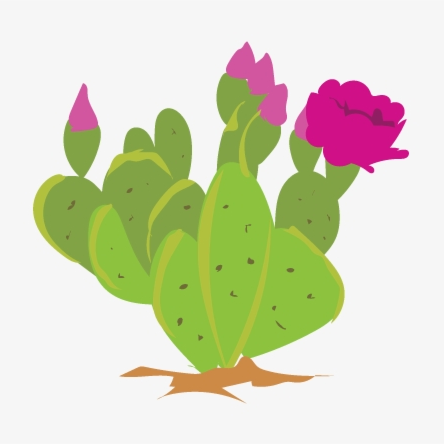19 Aug Life Can be Both Prickly & Beautiful! So Can You & I.
The hug your cactus journey is a journey of paradox, often holding two things up in tension that seem on the surface to be opposed to each other. The Meriam-Webster dictionary offers the following among its definitions for paradox.
1: one (such as a person, situation, or action) having seemingly contradictory qualities or phases.
2. a: a statement that is seemingly contradictory or opposed to common sense and yet is perhaps true.[i]
With this in mind I want to explore some of the paradoxes that make up the hug your cactus journey.
The image above is from one of the many cards I received after my mom died a few months ago. I have been truly touched by the ways people have started to identify the cactus itself and the journey it represents with my own journey. My collection of cactus themed items is becoming quite impressive. Yet, I think this particular card, which to give proper credit was distributed by Trader Joe’s and designed by one of their talented artists, speaks to an important paradox of the hug your cactus journey. Life is full of both prickly (painful) and beautiful moments, often at the same time. Therefore, life is not simply prickly or beautiful, it is often at the same time both prickly and beautiful. To take that paradox further then, not only is life both prickly and beautiful, but so are we. To hug your cactus then means to live in the tension between being both prickly and beautiful. It’s to embrace both the prickly and beautiful parts of self and integrate them into a more holistic sense of self.
The hug your cactus journey will almost always be entered into in response to a crisis. In facing this crisis, one must also accept that their crisis is self-imposed, as finding another person or even circumstance to place or blame their crisis on, simply does not work. The 12 Step tradition refers to this as admitting that life is no longer manageable. This generally comes from a pattern of behavior over time. When one realizes that they are in a self-imposed crisis this can lead to a sense of hopelessness or even despair. Yet, this is where another hug your cactus paradox comes in. In one’s lack of hope and even despair over their own ugliness they can also find hope and belief that things can and even will get better in the end. In the book Good to Great, Jim Collins calls this the Stockdale paradox, which is named after Admiral Jim Stockdale.
Retain faith that you can and will prevail in the end, regardless of the
difficulties,
AND at the same time,
Confront the most brutal facts of your current reality, whatever they might be.[ii]
In the hug your cactus journey that means accepting that you are responsible for your own crisis and to face the brutal realities of your current reality whatever they are. Yet in that you still need to have hope that things can and even will get better, despite how difficult they currently are.
Finally, I want to address the paradox associated with the idea of lament. When our life is in crisis it’s pretty easy to get caught up in our own self-pity party and cry out why me, or even why me God? Yet, to lament is to go beyond our own individual crisis and circumstances and seeks deeper answers. Lament is what happens when people ask,
Why?” and don’t get an answer. It’s where we get to when we move beyond our self-centered worry about our sins and failings and look more broadly at the suffering of the world” [iii]
Several of Psalms of the Jewish and Christian scriptures are considered Psalms of Lament. In these we see a person crying out to God in depths of their pain seeking answers. One of the most famous of these is Psalm 22 of David which begins with the very question that Jesus later echoes on the cross, “My God, my God, why have you forsaken me? (vs. 1)” Even in these Psalms of Lament the despair is generally not permanent, as the psalmist works through their lament and petitions, they also confess hope, faith, and trust that thing will work out in the end, which brings them to a place of praise, even in the midst of their sorrow and lament. A great example of this is found in Psalm 32 which moves from the depths of despair as the psalmist tries to deal with their crisis alone to joy as he confesses it. “But steadfast love surrounds the one who trusts in the LORD. Be glad in the LORD, and rejoice, O righteous, and shout for joy, all you upright in heart! (vs. 10-11)” You see, as you start to look past your own crisis and prickliness, you not only see the broader suffering of the world, you also see reasons to trust and be glad, to even hope in something better than your current reality.
So…
How can one then be both prickly and beautiful?
How can one face both brutal realities and yet maintain hope?
How can one both lament their despair, asking why, while trusting and shouting for joy?
By Hugging Your Cactus!
[i] https://www.merriam-webster.com/dictionary/paradox?utm_campaign=sd&utm_medium=serp&utm_source=jsonld
[ii] Jim Collins, Good to Great, Why Some Companies Make the Leap… and Others Don’t (New York: Harper Business, 2001), 86.
https://www.jimcollins.com/concepts/Stockdale-Concept.html
(Stockdale, was the highest-ranking United States military officer in the “Hanoi Hilton” prisoner-of-war camp during the height of the Vietnam War. Tortured over twenty times during his eight-year imprisonment from 1965 to 1973, Stockdale lived out the war without any prisoner’s rights, no set release date, and no certainty as to whether he would even survive to see his family again.)
[iii] N.T. Wright, Christianity Offers No Answers About the Coronavirus. It’s Not Supposed To. https://time.com/5808495/coronavirus-christianity/

No Comments